Related Research Articles

Darwinism is a theory of biological evolution developed by the English naturalist Charles Darwin (1809–1882) and others, stating that all species of organisms arise and develop through the natural selection of small, inherited variations that increase the individual's ability to compete, survive, and reproduce. Also called Darwinian theory, it originally included the broad concepts of transmutation of species or of evolution which gained general scientific acceptance after Darwin published On the Origin of Species in 1859, including concepts which predated Darwin's theories. English biologist Thomas Henry Huxley coined the term Darwinism in April 1860.

Reproduction is the biological process by which new individual organisms – "offspring" – are produced from their "parent" or parents. Reproduction is a fundamental feature of all known life; each individual organism exists as the result of reproduction. There are two forms of reproduction: asexual and sexual.

Evolutionary biology is the subfield of biology that studies the evolutionary processes that produced the diversity of life on Earth. It is also defined as the study of the history of life forms on Earth. Evolution holds that all species are related and gradually change over generations. In a population, the genetic variations affect the phenotypes of an organism. These changes in the phenotypes will be an advantage to some organisms, which will then be passed onto their offspring. Some examples of evolution in species over many generations are the peppered moth and flightless birds. In the 1930s, the discipline of evolutionary biology emerged through what Julian Huxley called the modern synthesis of understanding, from previously unrelated fields of biological research, such as genetics and ecology, systematics, and paleontology.
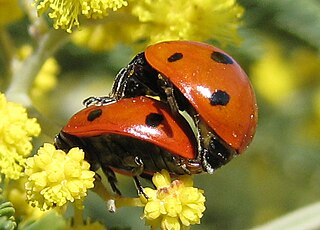
Sexual reproduction is an adaptive feature which is common to almost all multicellular organisms and various unicellular organisms. Currently, the adaptive advantage of sexual reproduction is widely regarded as a major unsolved problem in biology. As discussed below, one prominent theory is that sex evolved as an efficient mechanism for producing variation, and this had the advantage of enabling organisms to adapt to changing environments. Another prominent theory, also discussed below, is that a primary advantage of outcrossing sex is the masking of the expression of deleterious mutations. Additional theories concerning the adaptive advantage of sex are also discussed below. Sex does, however, come with a cost. In reproducing asexually, no time nor energy needs to be expended in choosing a mate and, if the environment has not changed, then there may be little reason for variation, as the organism may already be well-adapted. However, very few environments have not changed over the millions of years that reproduction has existed. Hence it is easy to imagine that being able to adapt to changing environment imparts a benefit. Sex also halves the amount of offspring a given population is able to produce. Sex, however, has evolved as the most prolific means of species branching into the tree of life. Diversification into the phylogenetic tree happens much more rapidly via sexual reproduction than it does by way of asexual reproduction.
Dr Tatiana's Sex Advice to All Creation: The Definitive Guide to the Evolutionary Biology of Sex is a 2002 popular science book by the British evolutionary biologist Olivia Judson written in the role of her alter ego, agony aunt Dr Tatiana. Dr Tatiana receives letters from various creatures about their sex lives, and responds by explaining the biology of sex to creatures concerned.
Dorion Sagan is an American essayist, fiction writer, poet, and theorist of ecology. He has written and co-authored books on culture, art, literature, evolution, and the history and philosophy of science, including Cosmic Apprentice,Cracking the Aging Code, and Lynn Margulis: The Life and Legacy of a Scientific Rebel.
Deborah Charlesworth is a population geneticist from the UK, notable for her important discoveries in population genetics and evolutionary biology. Her most notable research is in understanding the evolution of recombination, sex chromosomes and mating system for plants.
Eva Jablonka is an Israeli evolutionary theorist and geneticist, known especially for her interest in epigenetic inheritance. Born in 1952 in Poland, she emigrated to Israel in 1957. She is a professor at the Cohn Institute for the History of Philosophy of Science and Ideas at Tel Aviv University. In 1981 she was awarded the Landau prize of Israel for outstanding Master of Science (M.Sc.) work and in 1988, the Marcus prize for outstanding Ph.D. work. She is a proponent of academic freedom, recognising that on such matters, "academic and political issues cannot really be kept apart", although she is not a proponent of simplistic solutions, and shows a preference to describe her own position.

Geoffrey Franklin Miller is an American evolutionary psychologist, author, and associate professor of psychology at the University of New Mexico. He is known for his research on sexual selection in human evolution.
Horace Freeland Judson was a journalist and later with more prominence a historian of molecular biology including authoring several books, including The Eighth Day of Creation, a history of molecular biology, and The Great Betrayal: Fraud in Science, an examination of the deliberate manipulation of scientific data.
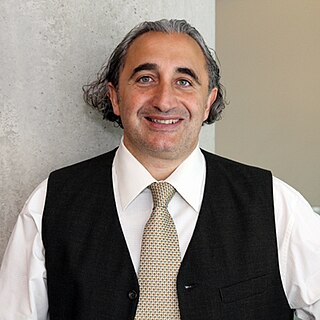
Gad Saad is a Canadian marketing professor at the John Molson School of Business at Concordia University. He is known for applying evolutionary psychology to marketing and consumer behaviour. He wrote a blog for Psychology Today and hosts a YouTube channel titled "The Saad Truth".
A cognitive module in cognitive psychology is a specialized tool or sub-unit that can be used by other parts to resolve cognitive tasks. It is used in theories of the modularity of mind and the closely related society of mind theory and was developed by Jerry Fodor. It became better known throughout cognitive psychology by means of his book, The Modularity of Mind (1983). The nine aspects he lists that make up a mental module are domain specificity, mandatory operation, limited central accessibility, fast processing, informational encapsulation,‘shallow’ outputs, fixed neural architecture, characteristic and specific breakdown patterns, and characteristic ontogenetic pace and sequencing. Not all of these are necessary for the unit to be considered a module, but they serve as general parameters.
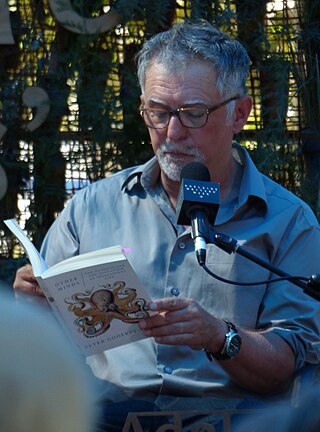
Peter Godfrey-Smith is an Australian philosopher of science and writer, who is currently Professor of History and Philosophy of Science at the University of Sydney. He works primarily in philosophy of biology and philosophy of mind, and also has interests in general philosophy of science, pragmatism, and some parts of metaphysics and epistemology. Godfrey-Smith was elected to the American Philosophical Society in 2022.
Bateman's principle, in evolutionary biology, is that in most species, variability in reproductive success is greater in males than in females. It was first proposed by Angus John Bateman (1919–1996), an English geneticist. Bateman suggested that, since males are capable of producing millions of sperm cells with little effort, while females invest much higher levels of energy in order to nurture a relatively small number of eggs, the female plays a significantly larger role in their offspring's reproductive success. Bateman's paradigm thus views females as the limiting factor of parental investment, over which males will compete in order to copulate successfully.
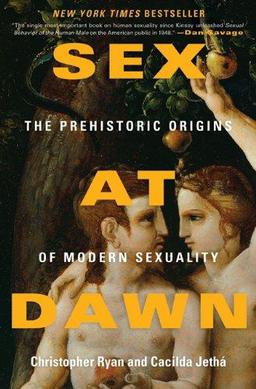
Sex at Dawn: The Prehistoric Origins of Modern Sexuality is a 2010 book about the evolution of human mating systems by Christopher Ryan and Cacilda Jethá. In opposition to what the authors see as the "standard narrative" of human sexual evolution, they contend that having multiple sexual partners was common and accepted in the environment of evolutionary adaptedness. The authors contend that mobile, self-contained groups of hunter-gatherers were the norm for humans before agriculture led to high population density. Before agriculture, according to the authors, sex was relatively promiscuous and paternity was not a concern. This dynamic is similar to the mating system of bonobos. According to the book, sexual interactions strengthened the bond of trust in the groups. Far from causing jealousy, social equilibrium and reciprocal obligation were strengthened by playful sexual interactions.

Faye Flam is an American journalist. She has written for Science Magazine and wrote two weekly columns for The Philadelphia Inquirer, including one on sex and one on evolution. Flam wrote a book on the influence of sex on human evolution and society. She teaches science writing and lectures on communication to scientific forums, and is a journalism critic for the MIT Knight Science Journalism Tracker.

Jan Maree Strugnell is an Australian evolutionary molecular biologist. She is a professor and director in the Centre for Sustainable Tropical Fisheries and Aquaculture at James Cook University, Townsville, Australia. Strugnell's work has investigated population and species level molecular evolution in Antarctic and deep sea species in the context of past geological and climatic change. Strugnell's work also uses genetic tools to help solve bottlenecks in aquaculture and fisheries industries.

Louise Allcock is a British researcher, best known for her work on ecology and evolution of the cephalopods of the Southern Ocean and deep sea. She is the editor of the Zoological Journal of the Linnean Society.
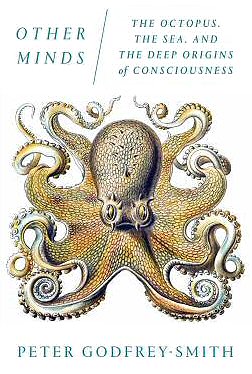
Other Minds is a 2016 bestseller by Peter Godfrey-Smith on the evolution and nature of consciousness. It compares the situation in cephalopods, especially octopuses and cuttlefish, with that in mammals and birds. Complex active bodies that enable and perhaps require a measure of intelligence have evolved three times, in arthropods, cephalopods, and vertebrates. The book reflects on the nature of cephalopod intelligence in particular, constrained by their short lifespan, and embodied in large part in their partly autonomous arms which contain more nerve cells than their brains.

Tanya M. Smith is a human evolutionary biologist, and Professor at the Australian Research Centre for Human Evolution, Griffith University.
References
- 1 2 3 4 "Dr Olivia Judson's animal magic". Reporter ("The Newspaper of Imperial College, London"). 11 July 2003.
- ↑ "Wissenschaftskolleg zu Berlin: Olivia Judson, Ph.D." Olivia Judson, Ph.D. Retrieved 1 January 2022.
- ↑ "John Simon Guggenheim Foundation | Olivia Judson" . Retrieved 8 March 2021.
- ↑ Judson, Olivia P. (1994). Parasites, sex and genetic variation in a model metapopulation (DPhil thesis). University of Oxford.
- ↑ "Olivia Judson".
- ↑ Dr Tatiana - Translations
- ↑ Judson, Olivia (30 December 2008). "Reflections on an Oyster". Opinionator. Retrieved 1 January 2022.
- ↑ Olivia Judson (29 June 2010). "So Long, and Thanks". The Wild Side blog at NYTimes.com.
- ↑ Judson, Olivia (22 February 2014). "The Memory Stone". Opinionator. Retrieved 1 January 2022.
- ↑ Olivia Judson (9 September 2008). "A Genetically Engineered Swat". The Wild Side blog at NYTimes.com.
- ↑ "Mount Erebus, Antarctica". Magazine. 1 July 2012. Archived from the original on 20 February 2021. Retrieved 1 January 2022.
- ↑ "Cassowaries". Magazine. 1 September 2013. Archived from the original on 28 July 2021. Retrieved 1 January 2022.
- ↑ "Luminous Life – National Geographic Magazine". Magazine. 1 March 2015. Archived from the original on 8 March 2021. Retrieved 1 January 2022.
- ↑ "Why Do Octopuses Remind Us So Much of Ourselves?". Magazine. 13 October 2016. Archived from the original on 28 February 2021. Retrieved 1 January 2022.
- ↑ The Max Planck Institute for History of Science – News
- ↑ Judson, Olivia P. (2017). "The energy expansions of evolution". Nature Ecology & Evolution. 1 (6). doi:10.1038/s41559-017-0138. PMID 28812646. S2CID 7207482.